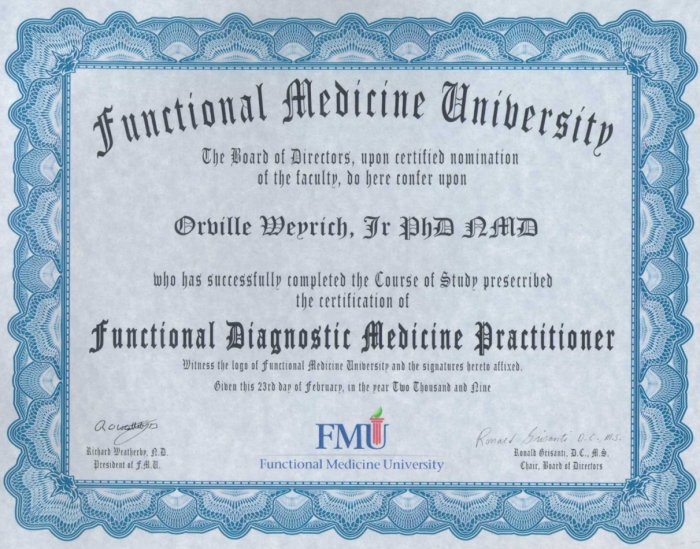In order to explain what "Functional Medicine" and "Functional Diagnostic Testing" are, it is necessary to contrast these concepts with the "standard" of conventional western allopathic medicine.
Conventional Western Allopathic Medicine
Conventional western allopathic medicine considers itself to be "evidence-based". In practice, this means that it uses statistics to decide what, if any, diagnosis should be given to a patient who complains of being "unwell". If a a diagnosis is made, then similar reasoning decides what, if any, treatments are appropriate.
In general, the "rule of evidence" used to determine whether a test is "abnormal", and therefore deserving a diagnosis, is that the test result must be "more than 95% certain to deviate from the population average." This rule of evidence is "baked in" to the "reference ranges" published for various laboratory tests, and codified in the "Standard of Care" rules promogulated by insurance companies and various allopathic institutions.
THis 95% rule says that if a "representative sample" of the "healthy" population [whatever that means in a generally unhealthy American population] is tested, a "bell-curve" distribution is expected, with 25 "outliers" on the left tail and 25 "outliers" on the right tail. These "outliers" are considered to be "abnormal" and the middle 950 individuals are considered to be "normal".
For example, the laboratory test "TSH" (Thyroid Stimulating Hormone) typically has a reference range of 0.45 to 4.5 (which varies slightly from one laboratory to another). In this scenario, if a patient has a TSH lab value of less than 0.45 then they are given the diagnosis of "hyperthyroid"; if a patient has a TSH value of more than 4.5 then the patient is given the diagnosis of "hypothyroid". [This is an over-simplification - sometimes an abnormal T4 test is also required before a diagnosis is triggered]. All other patients are dismissed as having "normal thyroid" (nothing to see here, move along).
The problem is some patients, who are categorized as "normal" by the conventional rules of evidence, none-the-less may have symptoms of a thyroid problem that actually responds to appropriate treatment. But the conventional standard of care dismisses these patients, and insurance regulations therefore will not pay for treatment.
This general approach can be categorized as "Boolean logic" - any proposition (diagnosis) is either "true" or "false" and there is no intermediate "gray area". But it violates common sense. How can a patient with a TSH of 0.45 be "perfectly healthy" and a patient with a TSH of 0.44 have a diagnosed illness of "hyperthyroid"?
From a public health policy this may make sense, where the Constitutional mandate is to optimize overall (average) public health ("general welfare") at the lowest possible overall (taxpayer) cost. This approach works out well for patients in the middle of the normal bell-curve (most people), but fails for individuals who are "unusual" for some reason, for example genetic variation, epigenetic influences, environmental influences, etc.
Functional Diagnostic Medicine
Functional Medicine literally complements conventional allopathic medicine, by looking within the 95% of the "bell curve" that conventional medicine dismisses as "normal" for clues to emerging problems and chronic complaints for which the patient does not feel well, but conventional medicine finds no treatable diagnosis - for example chronic fatigue syndrome.
Functional Diagnostic Testing starts with standard screening tests such as Comprehensive Metabolic Panel, Complete Blood Count, and Lipid Panel. Depending on your history and symptom picture, functional testing often adds tests such as:
- Organic Acid Test (screens for metabolic imbalances and certain infections).
- Comprehensive Stool and Digestive Analysis (screens for digestive disorders and certain infections).
- Cellular Nutrient Panels (examines the vitamins, minerals, and lipids that your cells are actually absorbing and using).
- Toxic Metals Hair or Urine Analysis (screens for toxic metal burdens).
- Amino Acid Panel (examines metabolic or nutritional imbalances).
- Food Allergy Testing (goes way beyond standard "skin-prick" tests).
- Hormonal Panels (detects imbalances in thyroid, adrenal, male/female, sugar metabolism, and other hormonal systems).
- Inflammatory markers (inflammation is responsible for many disease pathologies).
- Mucosal Barrier Testing (damaged gut lining can lead to many diseases).
- Liver Detoxification Panel (poor liver metabolism can lead to many diseases).
- Oxidative Stress Testing (oxidative damage can lead to many diseases).
- Genetic Testing (identifies disease susceptibilities and optimal treatment strategies).
- Disease-specific markers and indicators.
Some of the testing can be performed in your home with test kits to collect urine, saliva or stool. Some of the testing is done through conventional laboratories, while other tests are only available through specialty laboratories. During your consultation, we will determine which tests are needed and then our office assistants can review the testing recommendations, the instructions (e.g. fasting or non-fasting, etc.) and costs. Others may require you to go to a local laboratory to draw the blood. In all cases, we will assist you in coordinating initial and follow-up testing.
Occasionally, we may recommend certain tests that are not performed at our facility. In those instances, we can provide you with an order that you can take to a facility near your home, or we can schedule an appointment to have them done near our office.
 Click Here for Information About Functional Medicine University Click Here for Information About Functional Medicine University 
[Sponsored Advertisement] I have taken this program and I highly recommend it to all health-care providers - Orville R. Weyrich, Jr PhD NMD. |







